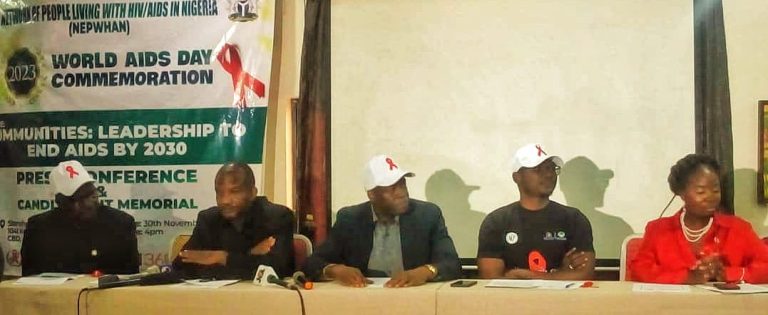By Justina Auta
Network of People Living with HIV/AIDS in Nigeria (NEPWHAN) and UNAIDS have unveiled “iMonitor +’” app to improve community engagement, access to treatment and fight stigma and discrimination against people living with the virus.
The National Coordinator of the network, Mr Abdulkadir Ibrahim, said at a news conference to mark the 2023 World AIDS Day (WAD) in Abuja that the application would improve access to data and communities’ engagement toward ending HIV/AIDS.
WAD is annually marked on Dec. 1 to raise awareness about the AIDS pandemic, caused by the spread of HIV infection.
AIDS is a chronic, potentially life-threatening condition caused by the Human Immunodeficiency Virus (HIV), which damages the immune system, interferes with the body’s ability to fight infections.
The global observance is, therefore, an opportunity for people worldwide to unite and show support to people living with HIV, commemorate those who died from AIDS-related illnesses, as well as advocate increased efforts to prevent new infections.
The theme of the global celebration is “Let Communities Lead”, domesticated in Nigeria as “Communities’ Leadership to End AIDS by 2030.”
The NEPWHAN and UNAIDS event also had a candlelight memorial for people who died of HIV/AIDS complications, where Ibrahim listed challenges faced by people living with the virus to include inequalities, stigma, and discrimination.
The NEPWHAN coordinator, therefore, stressed the need to tackle them and ensure people at the community level accessed life savings treatment, prevention activities and HIV testing services.
He said “those barriers limiting people knowing their status or going up to access the service are what we need to address to ensure that people, irrespective of the population, have these services.
“Discrimination, inequality and criminalisation need to be stopped.”
He encouraged the government to take up ownership in HIV/AIDS interventions by relying less on donor partners, allocating more resources, and locally manufacturing Antiretroviral (ARV) drugs to serve Nigerians and the West African region.
He added that “government needs to stop relying on donors.
“What government is putting on the table is actually small, and we even want the government, especially this new administration, to change its priority.
“Instead of buying ARV drugs annually, we look forward to manufacturing these drugs locally.
“I see no reason why Nigeria cannot move toward that direction as we have all it takes to serve the whole West African region and we can even generate income for the Nigerian economy.”
Mr Femi James, the Monitoring and Evaluation Officer of NEPWHAN, said the iMonitor app is a new digital approach that would improve community engagement, record all abuses and violations and track activities within a community.
He said “the community iMonitor application will help get the right data, strengthen the community of people living with HIV, the key population community with other partners.
“We cannot meet our 2030 target without getting the data right. NEPWHAN, through the support of UNAIDS developed the application to monitor community members on treatment, link them to treatment accordingly and help to fight stigma and discrimination.”
Dr Leopold Zekeng, the Country Director of UNAIDS, represented by Mr Gabriel Undelikwo, Community Specialist, stressed the need to strengthen partnership toward ending HIV/AIDS by 2030.
He said “today’s event is a clarion call for us to acknowledge and identify that together, we can achieve better.
“Each time we lose someone to HIV, it is a failure on our part, a call for us to change the narrative and we have all it takes to do, the interventions and everything to change that narrative.”
Ms Funmi Adesanya, Country Director, U.S. President’s Emergency Plan for AIDS Relief (PEPFAR), while remembering persons that died because of HIV/AID-related diseases, urged all to contribute toward ending the scourge by 2030.
He said that “the theme resonates with our mission and the role NEPWHAN plays in stigmatisation, discrimination of persons living with HIV to promote community led interventions and for us to truly end HIV by 2030.
“This will require each and every one of us led by the communities to achieve the goals.”
Also, Dr Richmond Iheme, representing the National Human Rights Commission (NHRC), reiterated commitment toward ensuring the rights of PLHIV were protected from abuse, violations, discrimination, and others.
He said “NHRC reechoes its commitment to work closely with communities concerned and partners to scale up interventions to address the outcries of infractions in the contexts of HIV/AIDS and the key populations.”
Dr James Anenih, the Director, Community Prevention and Care Department, National Agency for the Control of AIDS (NACA), said “this gives us a chance to look back at what we have done.
“What we have done right, reflects on some of the changes we need to make as we go forward to make the life of PLHIV better.
“It also gives us a chance to remember those we have lost along the way.
“We have lost them, but they have created a better future for the community living with HIV/AIDS. Because of them, you have better drugs today and care services.”


